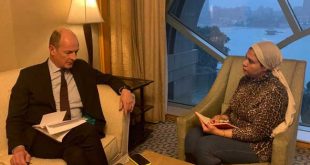Doaa Moneim – Ahram Online
In an interview with Ahram Online, during his visit to Cairo earlier this month , Richard Montgomery, British executive director of the World Bank (WB) and spokesperson of a high-level delegation of World Bank executive directors, talked about the delegation’s view of Egypt’s economic reform programme achievements and how they asses reform procedures.
What is your assessment of the Egyptian economic reform programme procedures and subsequent results?
The executive directors reviewed Egypt’s macro-economic indicators and see a great deal of progress made by the present government. The economy was stabilised, the deficit reduced, reserves have increased and after an initial spike inflation price rises have significantly reduced.
Two examples of achievements suggesting positive results on the ground stand out. The government has phased out regressive fuel subsidies. These were increasingly unaffordable and became an inefficient use of public money. The procedures to phase them out provide lessons for other countries.
The government redirected public money to expand social programmes benefiting the poorer sections of society. The Takaful and Karama programme has become a flagship social safety net in design and implementation. In addition, social housing programmes are operating at an increasing scale.
How do you evaluate the performance of Egypt’s macroeconomic signs?
GDP growth has risen significantly to 5.6%, which is a major achievement in a wider global economy with anemic growth rates.
How can the downsides of the economic reform programme, that took its toll on Egyptians, particularly the middle class, be dealt with; in terms of purchasing power and contributions to the economy?
Creating more and better jobs is a key priority for the next phase of Egypt’s reforms. This was a priority recognised in many at the discussion we had during our visit; with President Abdel-Fattah al-Sisi, the prime minister Mostafa Madbouly and other ministers.
What are the challenges that Egypt’s business and investment climate is facing that could undermine the economic reform?
Creating better conditions for the macro-economic environment is the first step, such as bringing inflation and interest rates to manageable levels; which has been achieved.
Reforming laws and regulations to reduce the costs of doing business is a further priority. Some progress has been made on these issues, but there is more that could be done.
Also, the government, the private sector and development partners need to work together to attract more investment in different areas of the economy.
The World Bank Group is doing more analytical work on these issues and hopes to identify key sectors with potential to create more jobs. Such analysis will help show how improvements to business conditions in specific sectors will help attract more investment and growth.
Cooperation between WB and Egypt has been ongoing for many years and has recently witnessed significant increase through several financing programmes. How do you see feature cooperation? and are there priority programmes to be implemented?
Yes, the World Bank work in Egypt has grown substantially since 2015, when it agreed a Country Partnership Framework with the government (2015-2019) to support the first wave of reforms. Now, it has a lending portfolio of $8 billion across 14 major projects and financing agreements.
The World Bank team in Cairo is at an early stage of discussion with the government a new Country Partnership Framework, which will be developed over the next five years to support the government’s second wave of reforms. This new framework hopes to agree how the World Bank Group can best support job creation and ensure Egypt’s growth is inclusive, enabling better incomes for people in all income groups across society.
The private sector requires encouragement to engage more in business and generate job opportunities. What is the role of the World Bank in enhancing private sector contribution to economic development?
The World Bank agrees with sectors identified, but needs to ensure its financing helps attract rather than substitutes for private sector investment. The private sector diagnostic underway by the World Bank’s private sector arm (the International Finance Corporation) will help define the role it might take in different sectors.
Investment in human resources is a top priority for Egypt in the current phase, especially in education and health. How can these efforts be supported with the launch of a comprehensive health insurance scheme and the education development programme?
The World Bank is very aware of the strong leadership being shown by Egypt in these areas, and we are looking at how best we can support the reforms in the coming framework period. A major focus needs to be on the quality of services and education in the coming years.
The World Bank has a Human carital project which is comparing progress across countries and sharing lessons on how to make more progress.
What is the most important global effort on the environment and the latest World Bank programme in this area? And what are the most important developments in Green Bonds and the extent of global demand for them?
The biggest global environmental challenge is to transition to lower carbon growth, by reducing, over time, fossil fuel use and emissions. The World Bank Group is the largest single development financier of green growth programmes.
Green Finance, and the use of Green Bonds, is increasing. Many countries have issued such bonds, though the market is still nascent. I understand the government of Egypt is considering such Green Bonds in the coming year.
Modern technology reflect on the size of jobs in the future and will lead to the disappearance of some of them with increasing unemployment rates. How can this challenge be met?
The World Bank has done a lot of analytical work on this issue. Overall, the potential is positive.
For instance, Sub-Saharan countries may enjoy digital technology adoption in different ways than other regions.
As our recent report issued in July coped with such a point, the region forges a different path from the rest of the world; if digital technologies are harnessed correctly by governments and businesses by ensuring that critical policies and investments are in place.
For Africa, to take advantage of these opportunities, there are several fundamental public policy recommendations for governments to consider. Ensuring that digital infrastructure is available and affordable to all in rural and urban areas, and across all demographics, providing complementary physical infrastructure such as reliable electricity, supporting the inventors and entrepreneurs that are needed to develop tools both for lifting the skills of workers in their current occupations and for the new tasks that new technologies will enable.
Africa needs to develop interventions to facilitate the productivity upgrading of informal farms and firms, upgrade the skills of their workers, and expand the coverage of social protection and labour systems, to workers, to spur greater entrepreneurial and worker risk-taking, and to facilitate worker transitions between jobs.
There will be some people who may lose, and we need to be careful about manufacturing industries which may face automation in the future. Any transition to new technology needs to be managed, and people affected negatively need support. But, overall, new technology will create more opportunities.






